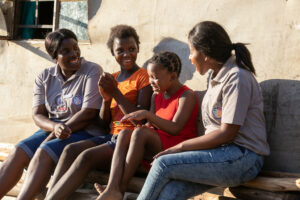World Children’s Day: m2m’s Commitment to Achieve a Better Future for Every Child
Today is World Children’s Day, which is celebrated every year on the 20th of November. The United Nations theme this year— A Better Future for Every Child— is especially critical given the tremendous toll that COVID-19 is taking on the world’s youngest citizens. Widespread closures of schools and early childhood development programmes, increased unemployment resulting in food insecurity and malnutrition, and greater difficulty accessing essential health services, have exposed children to health and developmental challenges that could last a lifetime, particularly in the world’s poorest countries.

m2m’s Children and Adolescents Are My Priority programme in Mpumalanga, South Africa
Children are also being left behind in the HIV response. According to UNAIDS, more than 350 children contract HIV each day in sub-Saharan Africa, and just 54% of children living with HIV in 2020 received treatment, compared to 74% of adults. Furthermore, UNAIDS reports that many children were not tested for HIV at birth and remain unaware of their HIV status, making finding them and bringing them into care a major challenge.
World Children’s Day 2021
At mothers2mothers (m2m), creating healthier and brighter futures for children is one of our major priorities. To fulfill our commitment that every child thrives, not just survives, m2m provides integrated health and development services for children in our core Peer Mentor programme across our countries of operation.
We asked Colile Mashaba about the challenges facing children in sub-Saharan Africa and how m2m is working to address them. She is District Coordinator for m2m’s Children and Adolescents Are My Priority (CHAMP) programme in the Mpumalanga province of South Africa, which is funded by the United States Agency for International Development (USAID). Mpumalanga has some of the highest numbers of orphans and other vulnerable children in the country, and Colile and a team of Mentor Mothers work tirelessly to ensure the health, well-being, and safety of this vulnerable population.
Q: What challenges do the children you work with face?

Colile Mashaba, m2m District Coordinator in South Africa
Many of the children live with their grandmothers after losing one or both of their parents. Some of them are living with HIV and have not been informed of their status or started on treatment.
For example, one of the families we work with has five children who had been forced to stay out of school because their grandmother could no longer afford to take them. They depend on their grandmother’s pension, which barely covers their groceries, let alone school supplies. When we visited this family, we also found that the youngest two, ages five and seven, are living with HIV and were not on treatment. They had both become so sick.
The grandmother explained to us that the children did not have birth certificates and so she could not get government assistance for them. We worked with the Department of Social Services to get their birth certificates. We got the older three enrolled back in school and the family now receives food parcels while they wait for their government assistance to be approved. I also took it on myself to drive the grandmother and the youngest two to the clinic so they could get started on treatment.
Unfortunately, these challenges are not unique to this family. Many of the children enrolled in our programme did not have birth certificates or attend school. The challenges are worse for children who are living with HIV. Most of them are not told of their HIV status and they stop their treatment because they do not understand why they have to take medication daily while their siblings do not.
Q: How do you work to address these challenges?
Since m2m works directly with health centres, we are able to help children access healthcare without their caregivers being judged for not bringing them in sooner. We work very closely with caregivers and educate them on the importance of telling children about their HIV status to help them understand why they need treatment. We also have sessions with the children on their own and prepare them for the news.
We also work very closely with other organisations, like Grassroots Soccer, to teach children about their safety and who to go to if they notice any signs of abuse at home. This is especially important for children who are vulnerable to exploitation.
Q: What impact has COVID-19 had on the children in the communities you serve?
When COVID-19 started, South Africa went into a hard lockdown where everything in the country came to a standstill. Some clinics were closed for only emergency services. Schools—the only place some children would find safety and get their proper meal of the day—closed. When the lockdown was extended beyond the initially planned three weeks, many people lost their jobs. This meant that livelihoods of children and their families were greatly affected.
Even when lockdown restrictions were eased and we could go back to work as part of essential services, many children had already defaulted on their treatment, and some were hard to locate because families were forced to move back to the villages. We worked so hard to bring as many of the children we work with back into care.
Q: What would you like the leaders in the countries m2m works in to commit to this World Children’s Day?
I want the world to remember that we have no future without children. When children thrive, we all thrive.






















